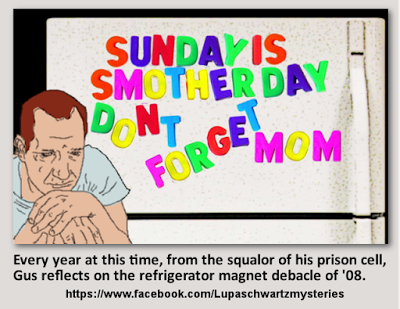J. David Core's Blog, page 16
July 9, 2015
Guestblog: The Robot Apocalypse And 6 Other Terrifying Futuristic Technology Scenarios by Amy Lane
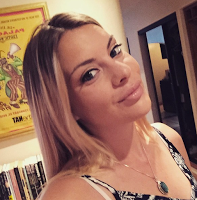
Writer Amy Lane lives in San Diego. When she's not blogging or tweeting, she can be found eating pizza and googling dinosaurs. Follow her on twitterLet’s travel back in time to 1984. Apple just unveiled the Macintosh personal computer. The Internet wasn’t really a thing. In other news, a cyborg was thrown back through the space-time continuum to kill Sarah Connor, and with it came the first big case of the cyber-heebie-jeebies.Doomsday style thriller The Terminator introduced a fear of technology to the masses, just as technology was beginning its rapid climb to where it is today. To fear technology in 2015 is to be incapacitated. From drone warfare, to making coffee – robots walk among us.If you think it’s only paranoid basement dweller types that fear the robot apocalypse, you’d be wrong.Renowned physicist Stephen Hawking has gone on the record a few times to warn about the great robot takeover looming on the horizon.Apple co-founder, Steve Wozniak, has even said that humanity will be reduced to robot pets in the future.How else could we be trumped by technology? Read on…
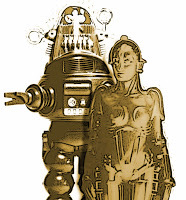 SingularityRay Kurzweil is a renowned inventor and futurist, who is currently on the payroll of Google as the Director of Engineering. His predictions often come true. More specifically, he’s pretty accurate about when they come true. Among his top predictions were the fall of the Soviet Union by 1991 and a machine beating a human chess player by 2000. He also predicted WiFi, facial recognition software, eBooks, and nanotechnology.So when Ray Kurzweil predicts that ‘Singularity’ may overthrow us, it’s best to listen up.According to Kurzweil, by 2045, technology will be so advanced that it will eclipse human understanding. If robots start to think independently, where does that leave us? Up poop creek, according to Stephen Hawking.“{Technology} would take off on its own and re-design itself at an ever increasing rate. Humans, who are limited by slow biological evolution, couldn’t compete, and would be superseded.” he said.Mathematician, Vernon Vinge was a bit more specific about the consequences the singularity could pose to humans. “The physical extinction of the human race is one possibility,” he wrote in a 1993 essay. No big deal then, Vinge?Grey GooGrey goo. It doesn’t sound that scary. But it is! The term ‘grey goo’ was originally coined by molecular nanotechnology (itty bitty ‘bots) guru, Eric Drexler. He described tiny, atom sized robots that had the ability to self-replicate. They would be invented for good, say for example, cleaning up an oil spill. But what if a programming error caused them to malfunction? Instead of consuming oil, they, say, consumed everything in sight, and started replicating so fast that we couldn’t control them. Within a few days of grey goo on the loose, the world’s resources would have disappeared, us along with them. Drexler went on to describe grey goo in more detail:“Dangerous replicators could easily be too tough, small, and rapidly spreading to stop — at least if we made no preparation. We have trouble enough controlling viruses and fruit flies.”Boom. End of the world.TranshumansTranshumans are expected to arrive shortly after the Singularity. Techno Nostradameus, Ray Kurzweil, theorized that humans could well be half-cyborg by 2030.If you think race relations are on the fritz now, wait until robots get involved. The physically and mentally superior cyborgs may well decide that traditional humans are the inferior race and either enslave them, or decide to wipe them out altogether. Resistance is futile.The Large Hadron Collider MalfunctionThe Large Hadron Collider is a big machine that looks pretty similar to the Stargate. Buried under the French-Swiss border, its purpose is to experiment with particles and discover more about them. This is done by firing atoms at each other at the speed of light. Scientists hope that the LHC could reveal vital clues about the origins of the Universe and what it’s made of.One itty bitty problem. In the process, it’s theoretically possible that scientists could accidentally create, or open a black hole. Nobody knows exactly what it’s like to be sucked into a black hole, but with gravitational pressure that could squish a solar system into a pack of cards, it’s probably not good.
SingularityRay Kurzweil is a renowned inventor and futurist, who is currently on the payroll of Google as the Director of Engineering. His predictions often come true. More specifically, he’s pretty accurate about when they come true. Among his top predictions were the fall of the Soviet Union by 1991 and a machine beating a human chess player by 2000. He also predicted WiFi, facial recognition software, eBooks, and nanotechnology.So when Ray Kurzweil predicts that ‘Singularity’ may overthrow us, it’s best to listen up.According to Kurzweil, by 2045, technology will be so advanced that it will eclipse human understanding. If robots start to think independently, where does that leave us? Up poop creek, according to Stephen Hawking.“{Technology} would take off on its own and re-design itself at an ever increasing rate. Humans, who are limited by slow biological evolution, couldn’t compete, and would be superseded.” he said.Mathematician, Vernon Vinge was a bit more specific about the consequences the singularity could pose to humans. “The physical extinction of the human race is one possibility,” he wrote in a 1993 essay. No big deal then, Vinge?Grey GooGrey goo. It doesn’t sound that scary. But it is! The term ‘grey goo’ was originally coined by molecular nanotechnology (itty bitty ‘bots) guru, Eric Drexler. He described tiny, atom sized robots that had the ability to self-replicate. They would be invented for good, say for example, cleaning up an oil spill. But what if a programming error caused them to malfunction? Instead of consuming oil, they, say, consumed everything in sight, and started replicating so fast that we couldn’t control them. Within a few days of grey goo on the loose, the world’s resources would have disappeared, us along with them. Drexler went on to describe grey goo in more detail:“Dangerous replicators could easily be too tough, small, and rapidly spreading to stop — at least if we made no preparation. We have trouble enough controlling viruses and fruit flies.”Boom. End of the world.TranshumansTranshumans are expected to arrive shortly after the Singularity. Techno Nostradameus, Ray Kurzweil, theorized that humans could well be half-cyborg by 2030.If you think race relations are on the fritz now, wait until robots get involved. The physically and mentally superior cyborgs may well decide that traditional humans are the inferior race and either enslave them, or decide to wipe them out altogether. Resistance is futile.The Large Hadron Collider MalfunctionThe Large Hadron Collider is a big machine that looks pretty similar to the Stargate. Buried under the French-Swiss border, its purpose is to experiment with particles and discover more about them. This is done by firing atoms at each other at the speed of light. Scientists hope that the LHC could reveal vital clues about the origins of the Universe and what it’s made of.One itty bitty problem. In the process, it’s theoretically possible that scientists could accidentally create, or open a black hole. Nobody knows exactly what it’s like to be sucked into a black hole, but with gravitational pressure that could squish a solar system into a pack of cards, it’s probably not good.
 Shutterstock image provided by the authorWWIIISince the Atomic bomb came along, everybody has been eyeing the event of WWIII as the end of the human race. Currently there are 15,000 nuclear weapons on Earth, belonging to nine countries. Some of them are much more powerful than the one that detonated in Hiroshima. Needless to say, 15,000 nuclear warheads going off would be enough to cripple the human race, bring on a thermo-nuclear ice age and essentially end the world.Scientists behind the Manhattan project designed the Doomsday Clock, designed to monitor how close humanity teeters to oblivion. Midnight is when everything goes kaboom. Currently we’re at 11:57pm. Time to dig a bunker and stockpile baked beans.The Chimera VirusIf the nukes don’t do us in, the Chimera virus might. The idea is of two killer viruses mutated together by mad scientists. Like any weapon of mass destruction, if released, the chimera virus could wipe out all living creatures. Say we were to combine two deadly viral strands: ebola and the common cold. If ebola became as easy to contract as the common cold, not many people would be able to escape it.GoogleIf you want to find a real world alternative to Skynet, look no further than Google. In the past few years, Google has purchased an impressive robot army. Almost every advanced robotics company has been bought by Google. This includes Boston Dynamics, responsible for building scary warbot Atlas, and DeepMind Technologies, who are creating a robot brain. Aside from that, the team of scientists hanging around Google’s offices are scary impressive. There’s Ray Kurzweil to start, and also Geoff Hinton, a leading expert on deep learning. Deep learning, the study of artificial intelligence. Look out, Apple. Google may have a terminator in a few years.If we thought the worst side effect of technology was selfies, clearly we could be in for a rude awakening. How do you think technology will take over the world? And remember: If the apocalypse comes, tweet me.Note: This article is reprinted from it's original appearance at this link.
Shutterstock image provided by the authorWWIIISince the Atomic bomb came along, everybody has been eyeing the event of WWIII as the end of the human race. Currently there are 15,000 nuclear weapons on Earth, belonging to nine countries. Some of them are much more powerful than the one that detonated in Hiroshima. Needless to say, 15,000 nuclear warheads going off would be enough to cripple the human race, bring on a thermo-nuclear ice age and essentially end the world.Scientists behind the Manhattan project designed the Doomsday Clock, designed to monitor how close humanity teeters to oblivion. Midnight is when everything goes kaboom. Currently we’re at 11:57pm. Time to dig a bunker and stockpile baked beans.The Chimera VirusIf the nukes don’t do us in, the Chimera virus might. The idea is of two killer viruses mutated together by mad scientists. Like any weapon of mass destruction, if released, the chimera virus could wipe out all living creatures. Say we were to combine two deadly viral strands: ebola and the common cold. If ebola became as easy to contract as the common cold, not many people would be able to escape it.GoogleIf you want to find a real world alternative to Skynet, look no further than Google. In the past few years, Google has purchased an impressive robot army. Almost every advanced robotics company has been bought by Google. This includes Boston Dynamics, responsible for building scary warbot Atlas, and DeepMind Technologies, who are creating a robot brain. Aside from that, the team of scientists hanging around Google’s offices are scary impressive. There’s Ray Kurzweil to start, and also Geoff Hinton, a leading expert on deep learning. Deep learning, the study of artificial intelligence. Look out, Apple. Google may have a terminator in a few years.If we thought the worst side effect of technology was selfies, clearly we could be in for a rude awakening. How do you think technology will take over the world? And remember: If the apocalypse comes, tweet me.Note: This article is reprinted from it's original appearance at this link.
Published on July 09, 2015 10:21
June 27, 2015
Call for Submissions - Inkitt's Sci-fi Writing Contest
"Beyond Tome." That's the title of Inkitt's science fiction writing contest. Submissions are open until 11:59 pm PST on July 27, 2015. Here's how the contest is described on the Inkitt contest page:
As always, this is just me sharing info. I am in no way compensated for sharing this, and its inclusion on my blog does not constitute an endorsement.
The third place winner will receive Brenda Ueland's If You Want to Write: A Book about Art, Independence and Spirit as well as a voucher for $20 worth of books. The second place prize is the same except the value of the voucher is $30. The grand prize includes Ms. Ueland's book as well as five printed-and-bound copies of the winner's story with custom typography created by Inkitt’s designer, and a Scrivener software package.Submit your most imaginative and fantastic science fiction stories! Transport us on a futuristic spaceship to meet extraterrestrial friends, experience other dimensions, or uncover a treasure through time travel. We want accounts that are spellbinding and world-altering, and we know you’ll deliver
There is no minimum or maximum word limit, and, as always, no entry fee. The stories that earn the top 10% of reader votes get the chance to be picked by the Inkitt staff for 1st, 2nd and 3rd prize.
Authors will retain all rights to works submitted to the contest.Multiple entries are allowed, but each individual participant may win only one prize.Old or previously published works are acceptable.Physical prizes can only be shipped to the United States, Canada, countries in the EU, and Australia/New Zealand.There is no age requirement for participation but all stories must be rated appropriately by their authors.Inkitt staff are not eligible to receive prizes, or be chosen as winners.Before submitting a story be sure to check our guidelines page to ensure that you comply with all of our publication rules.
As always, this is just me sharing info. I am in no way compensated for sharing this, and its inclusion on my blog does not constitute an endorsement.
Published on June 27, 2015 20:15
June 22, 2015
Release Date for Five Secrets
The next installment in the Lupa Schwartz Mystery Series, Five Secrets, will be released to the public in electronic formats as well as paperback on July 18. The introductory book in the series, Extreme Unction, is FREE in electronic formats at all of the major retailers, and all of the other books (including Five Secrets when it comes out) are currently each selling in eBook format for $2.99 until September, when they will return to their regular price. Extreme Unction is also now available in a much cheaper 2nd edition paperback. Here's the book description:
Now here's a brief excerpt to whet your appetites...
Excerpt
“The God I realized I believe in is hidden for a very different reason,” I said from my hospital bed. I’d been recovering from a stab wound for several weeks. It was touch and go for a while. The knife had nicked my spleen and lacerated my liver. I’d gotten a secondary infection after surgery, and my fever had spiked several times; but I was recovering nicely now, and Mia had come to visit from the house that she and I shared with her boss who was my - well, I don’t know what I’d call him. Lupa Schwartz was not my boss, and he wasn’t exactly my friend after the way he’d used me as bait to lure a murderer. But I needed to stay where I was in order to chronicle his cases for the magazine I worked for.I had come to Pittsburgh almost a year before in an attempt to simply score an interview with the man who, working as an independent contractor, had successfully resolved more unsolved murders in the tri-state area than any two official police investigators combined. However, what began as a hoped-for interview had snowballed into a living arrangement and a working partnership between Lupa Schwartz and myself.Mia pulled her fingers like a comb through my hair as she spoke in comforting tones. “What reason is that?” she asked genuinely curious. Mia was a Catholic, the same as our other roommate, Beverly Seanesy, Schwartz’s housekeeper. Well, maybe not the same as Beverly. Beverly’s Catholicism was the devout variety that did rosaries and went to confession. Mia’s was the nominal variety that wore a crucifix and only spoke about sex in whispers, but who nonetheless actually had sex, although probably with the crucifix still on. All of which was in stark contrast to the man of the house, who was a vocal and outspoken atheist; the kind that fundamentalists called “militant” despite his never having actually declared his intention to shoot anybody for their refusal to denounce faith.“That way we can find Him when we need Him,” I said answering her question about why I thought God was hidden. The question had come up as part of a discussion about why I had called things off with my most recent beau. I had been dating Schwartz’s friend, Ulric, a rabbi and a somewhat older man. Ulric was sweet and kind and handsome and charming; but he’d been too paternal; and I don’t think that was because of our age difference. I think that was just who Ulric was. Oddly, I’d seen Schwartz behave in much the same way with Beverly; and there was no secret that Beverly was madly in love with Schwartz. “Well,” Mia said, “I hope you let him down gently.”“I hope I did too,” I said. “I tried to.”“Has he called you since the break up?” Mia asked still tugging at my shaggy mane. It had grown-in more than I normally liked in the weeks since I’d been bed-ridden. “No,” I said, “I haven’t heard from him.”“Does your doctor still plan to release you tomorrow?” Mia asked mercifully changing the subject.***The ride home from the hospital had been quiet and awkward. Schwartz knew that I was furious with him, but I had the feeling that there was something more to it. There was something I was not being told. He and I had worked more than a few cases by this time. I knew his body language cues. I’d made it a point to learn them. Not only were they an insight into his character – which I needed to understand so I could write about him; they were an insight into his thought processes – which I wanted to understand so I could help him in his investigations. My father had been a gumshoe. I was instinctively drawn to that life.As we finally climbed to the top of Murray Avenue, I could see that there were several Pittsburgh police department cars parked on Hazelwood Avenue, and I knew that something was definitely going on. Schwartz pushed the button on his key-fob signaling the garage door to open, and as he pulled his Jensen into the drive that led to his private parking complex, I could see that standing outside one of the cruisers was Detective Trevor Johns. Something off was definitely going on. By the time Schwartz had returned the keys to Mia, off-loaded my bags, and we had climbed the stairs out of the subterranean car park to enter the main hall of Schwartz’s large Victorian home; Trevor had already rang the doorbell, and Beverly was already welcoming him into the residence along with two uniformed cops and a skinny guy with a laptop. “What’s going on?” I asked Schwartz as the door to the garage level shut behind me. He ignored me, and moved forward to greet Trevor, dropping my bags in the open foyer.Beverly retrieved the discarded luggage. “We didn’t want to tell you while you were in hospital,” she said as Schwartz and Trevor entered the office, “but Ulric has gone missing.”“Missing?” I said as I stormed past the uniform and entered the office before the door was fully closed. I stood slumped in the doorway, expecting to be rebuffed and told to leave.“Ah,” Schwartz said from his place behind his desk, “Ms. Hoskin, please have a seat. You look uncomfortable.” He directed me to sit across from him in the far seat of the two that faced his desk.“What’s this I hear about Ulric gone missing?” I demanded.“Cattleya,” Trevor said as he took the seat beside mine, “relax. It’s only been a few days.”“Is that why Mia was asking me so many questions about Ulric yesterday?”“We’re still trying to piece together the whole picture,” Trevor said. “I asked her to find out if Ulric had been in contact with you.”“Next time you want to grill me,” I said with a sarcastically curled lip and a wink, “do it yourself. Don’t be sending your girlfriend in to do your dirty work.” I sighed and shook my head, but sloughed it off. “You don’t think he hurt himself because of our breakup, do you?” I asked.“No,” Trevor said quickly. “I mean, at first we weren’t sure, but today we found this where Lupa said we should look for it, so now we need his help to decipher it.” Trevor was holding a flash drive in a plastic zip-lock baggie. “It was inside a puzzle box in his enigma room.” I’d been in that room. Ulric was a collector with two passions, maps and puzzles. His enigma room was filled wall-to-wall with every kind of brainteaser imaginable. If he’d taken the time to secret a flash drive in one of the many puzzle boxes he owned, I could understand why they’d come to Lupa Schwartz for help. Whatever information it contained would be cleverly encrypted, and it would take a sleuth of Schwartz’s abilities to decipher it.“It’s a code of some sort,” Trevor said. “There’s only one thing on it; a document in Word format. The entire document consists of three lines of text. Each is a long string of numbers. Do you think you can decipher it?”“Of course I do,” Schwartz said. “May I see it please?”“Do not copy the file or in any way alter it,” Trevor said. “It’s potential evidence.” My throat closed.Trevor handed the memory stick to Schwartz who slipped it into the port on the front of his computer tower. Momentarily he had the document open on his computer screen. It was just as Trevor had described it; three lines of numbers and nothing more. As Schwartz was loading the file, Trevor had invited the computer tech into the office. “Have a seat there,” Schwartz said indicating the couch just inside the entry beneath the fern. “Please open a notepad window and type the numbers as I call them out. Before typing, please press down on the alt-key and the plus-key on the numbers pad simultaneously, and hold them down as you strike the numerals I call-out. After each fourth number I call out, please release all of the keys.”“That would be for Unicode,” the tech said.“That’s right,” Schwartz said. “Actually, it’s technically ASCI in this particular circumstance.”“The numbers are not ASCI or Unicode,” the tech insisted.Schwartz pushed back from his position behind his keyboard. “Do you have a copy of the file saved on your laptop?” he asked. The tech indicated that he had. “Open it for a moment.” The tech opened his copy of the file. “Please read off the first line of numbers.” The tech read aloud the string of seemingly random numerals; 073146118357129360097868863372879143615591873110884111160872617100105622871149. As he read, Schwartz leaned in to read along. From his vantage, Trevor could see neither screen, and I was sitting too far away to be able to follow along from the monitor. However, I was not so far away that I didn’t notice a brief flash on Schwartz’s display. For a brief moment, extra characters had appeared and then vanished.As he finished reading the string of numbers, the tech said, “That’s not ACSI code. I tried it, and it comes up gibberish.” “It is if we put a zero at the front of every three digits,” Schwartz said. “Please type this into the notepad window: zero zero seven three.”“That’s a capital letter I,” the tech said.“Zero one four six,” Schwartz continued.“An apostrophe,” the tech announced. Minutes later the tech was reading the first line of text. “I’ve had to go into hiding.” Before long, we had the entire message:
Schwartz shook his head. “Prior to 1987, Washington’s Landing was known as Herrs Island,” Schwartz said. “It was spelled without an apostrophe, just like in the coded message. That wasn’t an oversight. Earlier in the message Ulric used the apostrophe in the word ‘I’ve.’ If he was using a possessive he’d have used it again. The word ‘his’ references Washington, and the word ‘Herrs’ references the alternate name. His and Herrs means Washinton’s and Herrs. Ulric Devacki is on Washington’s Landing in the Allegheny River, and he’s in hiding because he feels his life is in danger.”
###
Get more information on where to get the book here at this link.
After surviving a vicious attack, magazine reporter Cattleya Hoskin learns that her ex-boyfriend, Ulric, has gone missing having left only a coded message the police cannot decipher. Digging deeper, she learns that he'd been working with the man who got her injured on the last story she covered, Pittsburgh PI Lupa Schwartz. The two men had been trying to covertly unravel a centuries-old scheme, but the conspirators found him out and drove Ulric underground. To complicate matters, a mystery woman arrives with a tale of peril linking her to the same nefarious plot.
In order to protect this client and Ulric, Cattleya and Schwartz delve into the mysteries of sacred geometry and a genetic line that traces back to Charlemagne and beyond. Now the pair must work together to expose an ancient secret before being thwarted by the agents of a shadow government which has been secretly operating since Mesopotamia.
If they succeed, they just might topple an empire. If they fail, there may be no place for them in the New World Order -- or anywhere else.
Now here's a brief excerpt to whet your appetites...
Excerpt
“The God I realized I believe in is hidden for a very different reason,” I said from my hospital bed. I’d been recovering from a stab wound for several weeks. It was touch and go for a while. The knife had nicked my spleen and lacerated my liver. I’d gotten a secondary infection after surgery, and my fever had spiked several times; but I was recovering nicely now, and Mia had come to visit from the house that she and I shared with her boss who was my - well, I don’t know what I’d call him. Lupa Schwartz was not my boss, and he wasn’t exactly my friend after the way he’d used me as bait to lure a murderer. But I needed to stay where I was in order to chronicle his cases for the magazine I worked for.I had come to Pittsburgh almost a year before in an attempt to simply score an interview with the man who, working as an independent contractor, had successfully resolved more unsolved murders in the tri-state area than any two official police investigators combined. However, what began as a hoped-for interview had snowballed into a living arrangement and a working partnership between Lupa Schwartz and myself.Mia pulled her fingers like a comb through my hair as she spoke in comforting tones. “What reason is that?” she asked genuinely curious. Mia was a Catholic, the same as our other roommate, Beverly Seanesy, Schwartz’s housekeeper. Well, maybe not the same as Beverly. Beverly’s Catholicism was the devout variety that did rosaries and went to confession. Mia’s was the nominal variety that wore a crucifix and only spoke about sex in whispers, but who nonetheless actually had sex, although probably with the crucifix still on. All of which was in stark contrast to the man of the house, who was a vocal and outspoken atheist; the kind that fundamentalists called “militant” despite his never having actually declared his intention to shoot anybody for their refusal to denounce faith.“That way we can find Him when we need Him,” I said answering her question about why I thought God was hidden. The question had come up as part of a discussion about why I had called things off with my most recent beau. I had been dating Schwartz’s friend, Ulric, a rabbi and a somewhat older man. Ulric was sweet and kind and handsome and charming; but he’d been too paternal; and I don’t think that was because of our age difference. I think that was just who Ulric was. Oddly, I’d seen Schwartz behave in much the same way with Beverly; and there was no secret that Beverly was madly in love with Schwartz. “Well,” Mia said, “I hope you let him down gently.”“I hope I did too,” I said. “I tried to.”“Has he called you since the break up?” Mia asked still tugging at my shaggy mane. It had grown-in more than I normally liked in the weeks since I’d been bed-ridden. “No,” I said, “I haven’t heard from him.”“Does your doctor still plan to release you tomorrow?” Mia asked mercifully changing the subject.***The ride home from the hospital had been quiet and awkward. Schwartz knew that I was furious with him, but I had the feeling that there was something more to it. There was something I was not being told. He and I had worked more than a few cases by this time. I knew his body language cues. I’d made it a point to learn them. Not only were they an insight into his character – which I needed to understand so I could write about him; they were an insight into his thought processes – which I wanted to understand so I could help him in his investigations. My father had been a gumshoe. I was instinctively drawn to that life.As we finally climbed to the top of Murray Avenue, I could see that there were several Pittsburgh police department cars parked on Hazelwood Avenue, and I knew that something was definitely going on. Schwartz pushed the button on his key-fob signaling the garage door to open, and as he pulled his Jensen into the drive that led to his private parking complex, I could see that standing outside one of the cruisers was Detective Trevor Johns. Something off was definitely going on. By the time Schwartz had returned the keys to Mia, off-loaded my bags, and we had climbed the stairs out of the subterranean car park to enter the main hall of Schwartz’s large Victorian home; Trevor had already rang the doorbell, and Beverly was already welcoming him into the residence along with two uniformed cops and a skinny guy with a laptop. “What’s going on?” I asked Schwartz as the door to the garage level shut behind me. He ignored me, and moved forward to greet Trevor, dropping my bags in the open foyer.Beverly retrieved the discarded luggage. “We didn’t want to tell you while you were in hospital,” she said as Schwartz and Trevor entered the office, “but Ulric has gone missing.”“Missing?” I said as I stormed past the uniform and entered the office before the door was fully closed. I stood slumped in the doorway, expecting to be rebuffed and told to leave.“Ah,” Schwartz said from his place behind his desk, “Ms. Hoskin, please have a seat. You look uncomfortable.” He directed me to sit across from him in the far seat of the two that faced his desk.“What’s this I hear about Ulric gone missing?” I demanded.“Cattleya,” Trevor said as he took the seat beside mine, “relax. It’s only been a few days.”“Is that why Mia was asking me so many questions about Ulric yesterday?”“We’re still trying to piece together the whole picture,” Trevor said. “I asked her to find out if Ulric had been in contact with you.”“Next time you want to grill me,” I said with a sarcastically curled lip and a wink, “do it yourself. Don’t be sending your girlfriend in to do your dirty work.” I sighed and shook my head, but sloughed it off. “You don’t think he hurt himself because of our breakup, do you?” I asked.“No,” Trevor said quickly. “I mean, at first we weren’t sure, but today we found this where Lupa said we should look for it, so now we need his help to decipher it.” Trevor was holding a flash drive in a plastic zip-lock baggie. “It was inside a puzzle box in his enigma room.” I’d been in that room. Ulric was a collector with two passions, maps and puzzles. His enigma room was filled wall-to-wall with every kind of brainteaser imaginable. If he’d taken the time to secret a flash drive in one of the many puzzle boxes he owned, I could understand why they’d come to Lupa Schwartz for help. Whatever information it contained would be cleverly encrypted, and it would take a sleuth of Schwartz’s abilities to decipher it.“It’s a code of some sort,” Trevor said. “There’s only one thing on it; a document in Word format. The entire document consists of three lines of text. Each is a long string of numbers. Do you think you can decipher it?”“Of course I do,” Schwartz said. “May I see it please?”“Do not copy the file or in any way alter it,” Trevor said. “It’s potential evidence.” My throat closed.Trevor handed the memory stick to Schwartz who slipped it into the port on the front of his computer tower. Momentarily he had the document open on his computer screen. It was just as Trevor had described it; three lines of numbers and nothing more. As Schwartz was loading the file, Trevor had invited the computer tech into the office. “Have a seat there,” Schwartz said indicating the couch just inside the entry beneath the fern. “Please open a notepad window and type the numbers as I call them out. Before typing, please press down on the alt-key and the plus-key on the numbers pad simultaneously, and hold them down as you strike the numerals I call-out. After each fourth number I call out, please release all of the keys.”“That would be for Unicode,” the tech said.“That’s right,” Schwartz said. “Actually, it’s technically ASCI in this particular circumstance.”“The numbers are not ASCI or Unicode,” the tech insisted.Schwartz pushed back from his position behind his keyboard. “Do you have a copy of the file saved on your laptop?” he asked. The tech indicated that he had. “Open it for a moment.” The tech opened his copy of the file. “Please read off the first line of numbers.” The tech read aloud the string of seemingly random numerals; 073146118357129360097868863372879143615591873110884111160872617100105622871149. As he read, Schwartz leaned in to read along. From his vantage, Trevor could see neither screen, and I was sitting too far away to be able to follow along from the monitor. However, I was not so far away that I didn’t notice a brief flash on Schwartz’s display. For a brief moment, extra characters had appeared and then vanished.As he finished reading the string of numbers, the tech said, “That’s not ACSI code. I tried it, and it comes up gibberish.” “It is if we put a zero at the front of every three digits,” Schwartz said. “Please type this into the notepad window: zero zero seven three.”“That’s a capital letter I,” the tech said.“Zero one four six,” Schwartz continued.“An apostrophe,” the tech announced. Minutes later the tech was reading the first line of text. “I’ve had to go into hiding.” Before long, we had the entire message:
I’ve had to go into hiding. My life is in danger. Tell Schwartz you’ll find me on Washington, his and Herrs.“It’s another puzzle,” Trevor said in clear annoyance.“He’s on Washington’s Landing,” Schwartz announced confidently.“It could mean that,” Trevor agreed. “Or it could mean Mount Washington or Little Washington.”
Schwartz shook his head. “Prior to 1987, Washington’s Landing was known as Herrs Island,” Schwartz said. “It was spelled without an apostrophe, just like in the coded message. That wasn’t an oversight. Earlier in the message Ulric used the apostrophe in the word ‘I’ve.’ If he was using a possessive he’d have used it again. The word ‘his’ references Washington, and the word ‘Herrs’ references the alternate name. His and Herrs means Washinton’s and Herrs. Ulric Devacki is on Washington’s Landing in the Allegheny River, and he’s in hiding because he feels his life is in danger.”
###
Get more information on where to get the book here at this link.
Published on June 22, 2015 09:00
June 15, 2015
Three New Paperback Covers
I have two new novels coming out this year, and have already revealed the electronic covers for both, but this week I finally got around to designing the paperback covers. The first cover is for the latest Lupa Schwartz mystery novel, Five Secrets. I used a photo my girlfriend shot at the Phipps Conservatory in Pittsburgh. The photo features orchids and a few other tropical plants.
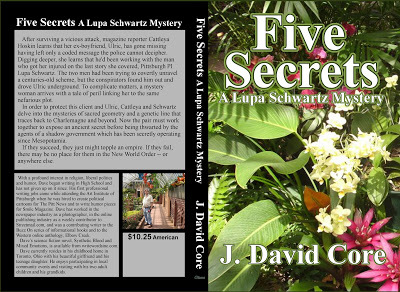 Click to see a larger image.The next cover is for a collection of noir stories I am publishing at the end of the year after the second season of my podcast concludes. I made this cover with royalty free images.
Click to see a larger image.The next cover is for a collection of noir stories I am publishing at the end of the year after the second season of my podcast concludes. I made this cover with royalty free images.
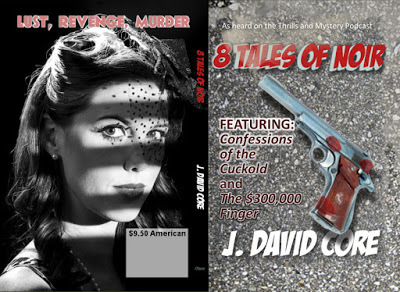 Click to see a larger image. The third cover is for the re-release of the first Lupa Schwartz novel, Extreme Unction. I released it in May of 2013, and have learned a lot since then. You'll also notice that the price of the new release of Extreme Unction is greatly reduced.
Click to see a larger image. The third cover is for the re-release of the first Lupa Schwartz novel, Extreme Unction. I released it in May of 2013, and have learned a lot since then. You'll also notice that the price of the new release of Extreme Unction is greatly reduced.
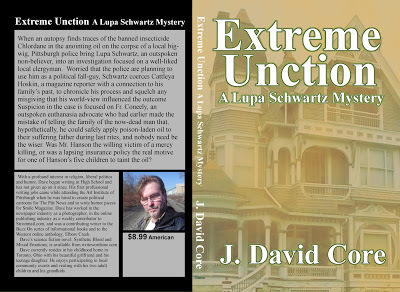 Click to see a larger image.This second edition of Extreme Unction will be available in a couple of weeks. All of my paperback books are available at Amazon, at Barnes & Noble and can be purchased directly through Createspace.
Click to see a larger image.This second edition of Extreme Unction will be available in a couple of weeks. All of my paperback books are available at Amazon, at Barnes & Noble and can be purchased directly through Createspace.
 Click to see a larger image.The next cover is for a collection of noir stories I am publishing at the end of the year after the second season of my podcast concludes. I made this cover with royalty free images.
Click to see a larger image.The next cover is for a collection of noir stories I am publishing at the end of the year after the second season of my podcast concludes. I made this cover with royalty free images. Click to see a larger image. The third cover is for the re-release of the first Lupa Schwartz novel, Extreme Unction. I released it in May of 2013, and have learned a lot since then. You'll also notice that the price of the new release of Extreme Unction is greatly reduced.
Click to see a larger image. The third cover is for the re-release of the first Lupa Schwartz novel, Extreme Unction. I released it in May of 2013, and have learned a lot since then. You'll also notice that the price of the new release of Extreme Unction is greatly reduced. Click to see a larger image.This second edition of Extreme Unction will be available in a couple of weeks. All of my paperback books are available at Amazon, at Barnes & Noble and can be purchased directly through Createspace.
Click to see a larger image.This second edition of Extreme Unction will be available in a couple of weeks. All of my paperback books are available at Amazon, at Barnes & Noble and can be purchased directly through Createspace.
Published on June 15, 2015 06:00
June 6, 2015
Danny and the Three Monsters by Andrew Joyce's Dog
Administrator's Note:Today's post represents a milestone for this blog as it is the first non-human composition to grace these pages. The author, Danny, is apparently a cute little dog. I might be wrong, but I think he's a Bichon Frise, although he might just as easily be a mix breed or even an Ewok in a collar.
Anyway, the dog's owner is a respected author with a new book out that's performing very well on Amazon. It's a 100,000 word historical adventure tale called Molly Lee. I'll let you know what it's about in a few seconds, and then we'll let the author, Andrew Joyce, have a few words before Danny takes over. Here's the book's description:
 Molly is about to set off on the adventure of a lifetime . . . of two lifetimes. It’s 1861 and the Civil War has just started. Molly is an eighteen-year-old girl living on her family’s farm in Virginia when two deserters from the Southern Cause enter her life. One of them—a twenty-four-year-old Huck Finn—ends up saving her virtue, if not her life.
Molly is about to set off on the adventure of a lifetime . . . of two lifetimes. It’s 1861 and the Civil War has just started. Molly is an eighteen-year-old girl living on her family’s farm in Virginia when two deserters from the Southern Cause enter her life. One of them—a twenty-four-year-old Huck Finn—ends up saving her virtue, if not her life.Molly is so enamored with Huck, she wants to run away with him. But Huck has other plans and is gone the next morning before she awakens. Thus starts a sequence of events that leads Molly into adventure after adventure; most of them not so nice.
We follow the travails of Molly Lee, starting when she is eighteen and ending when she is fifty-six. Even then Life has one more surprise in store for her.
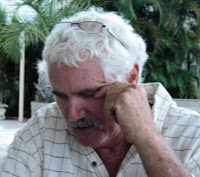 My name is Andrew Joyce and I write books for a living. Dave has been kind enough to allow me a little space on his blog to promote my latest book,
MOLLY LEE
. It’s averaging 4.9 stars on Amazon and for the next few days it will be priced at 0.99 cents. It is also available in paperback. Please check it out. Here’s the link . . . http://geni.us/mollyI would love to tell you all about it, but instead, I have to turn the writing duties over to my dog whose name is Danny. You see, he can be pretty insistent at times. We recently had some excitement in our lives and he can’t wait to tell you about it. For what it’s worth, this is a true story. And when you are finished reading it, please click on the link to my book and check it out. Danny is not the only genius in our household.
My name is Andrew Joyce and I write books for a living. Dave has been kind enough to allow me a little space on his blog to promote my latest book,
MOLLY LEE
. It’s averaging 4.9 stars on Amazon and for the next few days it will be priced at 0.99 cents. It is also available in paperback. Please check it out. Here’s the link . . . http://geni.us/mollyI would love to tell you all about it, but instead, I have to turn the writing duties over to my dog whose name is Danny. You see, he can be pretty insistent at times. We recently had some excitement in our lives and he can’t wait to tell you about it. For what it’s worth, this is a true story. And when you are finished reading it, please click on the link to my book and check it out. Danny is not the only genius in our household.Danny and the Three Monsters
Hello dog fans, it is I, Danny the Dog! I haven’t been writing much lately because I’ve been helping my human, whose name is Andrew, look after three Labrador retrievers. What a nightmare! There is Chloe, who is fourteen months old, and then there is Beau and Hank. They are both four months old and they are holy terrors. They live on a boat down at the end of the dock. Their human was going out of town and he asked my human to look after them and Andrew, being the idiot that he is, said yes.
 First of all, I want to say to Jeff, the human that lives with the three monsters, don’t ever leave them in Andrew’s care again. I wouldn’t trust him to look after a taco, much less three dogs.The trouble started right away. Jeff had two crates (humans call them crates; I call them cages) for Beau and Hank because, as I’ve said, they are holy terrors. Andrew went over to take them for their first walk after Jeff left, and of course, he has to take me along to help out. Anyway, Andrew gets them out of the crates and is getting them off the boat when clumsy Hank falls into the water.Let me paint the picture for you. It was nighttime. It was dark. The water was dark and Hank is black. Andrew and I could see nothing of Hank. We could only hear him splashing around. The dock is about five feet above the water so Andrew couldn’t get him out by standing on the dock. Being the genius that he is (just kidding), Andrew got on the swim platform, which—for you landlubbers—is attached to the back of a boat and is only a foot above the water.Now this is where Andrew’s “genius” comes into play. He took off his glasses and placed them on the transom so they wouldn’t slip off while he was bending over to pull Hank out of the water. He called to Hank. Hank swam over and Andrew got him onto the boat. Then Andrew went to get his glasses and they were not there or anywhere else on the boat. It looked as though Beau knocked them into the water because he had his paws up in that general vicinity while he was watching Andrew rescue his brother (they’re twins). All this in the first five minutes of Andrew looking after the monsters. And it only got better, and by better, I mean worse. I had a ball watching Andrew trying to cope for four days.On to the next disaster, but first a side note. For some reason Beau is enthralled with me. The damn dog wouldn’t leave me alone. He put his snoot in my face, ran around me, bounced around me; he was a royal pain in my rear end. Finally, I had to growl at him and give him a little nip on his snoot to get some peace. Now back to Andrew’s genius. We got the dogs back on the boat without further mishaps. Andrew fed them and all was well. But then Andrew decided not to put Hank and Beau in their crates. He felt sorry for them being cooped up like that. Big mistake!The next morning when we went to get them, there was poop everywhere. The whole floor was covered in it. The babies had gotten into the dog food bag, ripped it open and ate it all. Then they pooped everywhere and walked in it. They got it on the couch, on the sliding glass doors, on everything. I think even on the ceiling. Needless to say, after spending two hours cleaning it all up, Andrew changed his mind about the crates.Last night we were hanging out. Andrew was staring into space because he did not have his glasses and could not read a book or see the computer screen. I was on the computer starting this story when Chloe came onto our boat. She’s always coming here and stealing my water bowl! To date, she has taken five. But she should have been locked up on her own boat! Andrew got up, looked out, saw Jeff, and said, “Thank God! Thank God!” I barked the same thing. Our days of taking care of the monsters were over. Thank God!P.S. This morning Jeff came over with Andrew’s glasses. Beau had taken them and hidden them in his stash place. And by the way, I have my own Facebook page and it’s a lot cooler than Andrew’s. Here’s a link: http://geni.us/dannythedog
First of all, I want to say to Jeff, the human that lives with the three monsters, don’t ever leave them in Andrew’s care again. I wouldn’t trust him to look after a taco, much less three dogs.The trouble started right away. Jeff had two crates (humans call them crates; I call them cages) for Beau and Hank because, as I’ve said, they are holy terrors. Andrew went over to take them for their first walk after Jeff left, and of course, he has to take me along to help out. Anyway, Andrew gets them out of the crates and is getting them off the boat when clumsy Hank falls into the water.Let me paint the picture for you. It was nighttime. It was dark. The water was dark and Hank is black. Andrew and I could see nothing of Hank. We could only hear him splashing around. The dock is about five feet above the water so Andrew couldn’t get him out by standing on the dock. Being the genius that he is (just kidding), Andrew got on the swim platform, which—for you landlubbers—is attached to the back of a boat and is only a foot above the water.Now this is where Andrew’s “genius” comes into play. He took off his glasses and placed them on the transom so they wouldn’t slip off while he was bending over to pull Hank out of the water. He called to Hank. Hank swam over and Andrew got him onto the boat. Then Andrew went to get his glasses and they were not there or anywhere else on the boat. It looked as though Beau knocked them into the water because he had his paws up in that general vicinity while he was watching Andrew rescue his brother (they’re twins). All this in the first five minutes of Andrew looking after the monsters. And it only got better, and by better, I mean worse. I had a ball watching Andrew trying to cope for four days.On to the next disaster, but first a side note. For some reason Beau is enthralled with me. The damn dog wouldn’t leave me alone. He put his snoot in my face, ran around me, bounced around me; he was a royal pain in my rear end. Finally, I had to growl at him and give him a little nip on his snoot to get some peace. Now back to Andrew’s genius. We got the dogs back on the boat without further mishaps. Andrew fed them and all was well. But then Andrew decided not to put Hank and Beau in their crates. He felt sorry for them being cooped up like that. Big mistake!The next morning when we went to get them, there was poop everywhere. The whole floor was covered in it. The babies had gotten into the dog food bag, ripped it open and ate it all. Then they pooped everywhere and walked in it. They got it on the couch, on the sliding glass doors, on everything. I think even on the ceiling. Needless to say, after spending two hours cleaning it all up, Andrew changed his mind about the crates.Last night we were hanging out. Andrew was staring into space because he did not have his glasses and could not read a book or see the computer screen. I was on the computer starting this story when Chloe came onto our boat. She’s always coming here and stealing my water bowl! To date, she has taken five. But she should have been locked up on her own boat! Andrew got up, looked out, saw Jeff, and said, “Thank God! Thank God!” I barked the same thing. Our days of taking care of the monsters were over. Thank God!P.S. This morning Jeff came over with Andrew’s glasses. Beau had taken them and hidden them in his stash place. And by the way, I have my own Facebook page and it’s a lot cooler than Andrew’s. Here’s a link: http://geni.us/dannythedogYou can find more about Andrew's other book, Redemption: The Further Adventures of Tom Sawyer and Huck Finn, here.
Published on June 06, 2015 23:34
May 18, 2015
Thrills and Mystery Podcast now on Podiobooks
Last week, The Thrills and Mystery Archive - season one made its Podiobooks debut. It features the entire first season of Thrills and Mystery Podcast minus one episode which was pulled because of the inability to mark one episode as adults only content without marking the entire book that way.
 Season two of the podcast debuts in five weeks, and in the meantime, we are presenting interviews with some of the authors from season one. I had four noir stories featured in season one, and will have two more featured in season two. Then at the end of season two, I'll publish a collection of all of my stories from the podcast as well as two of my previously published noir novellas; Wingman and Confessions of the Cuckold. That book will be called 8 Tales of Noir and will be available in both paperback and electronic versions available for download on all of the major retailers. The current version of the cover is shown here.
Season two of the podcast debuts in five weeks, and in the meantime, we are presenting interviews with some of the authors from season one. I had four noir stories featured in season one, and will have two more featured in season two. Then at the end of season two, I'll publish a collection of all of my stories from the podcast as well as two of my previously published noir novellas; Wingman and Confessions of the Cuckold. That book will be called 8 Tales of Noir and will be available in both paperback and electronic versions available for download on all of the major retailers. The current version of the cover is shown here.
So check out the podcast on iTunes or Stitcher, or get the podcast on YouTube.
 Season two of the podcast debuts in five weeks, and in the meantime, we are presenting interviews with some of the authors from season one. I had four noir stories featured in season one, and will have two more featured in season two. Then at the end of season two, I'll publish a collection of all of my stories from the podcast as well as two of my previously published noir novellas; Wingman and Confessions of the Cuckold. That book will be called 8 Tales of Noir and will be available in both paperback and electronic versions available for download on all of the major retailers. The current version of the cover is shown here.
Season two of the podcast debuts in five weeks, and in the meantime, we are presenting interviews with some of the authors from season one. I had four noir stories featured in season one, and will have two more featured in season two. Then at the end of season two, I'll publish a collection of all of my stories from the podcast as well as two of my previously published noir novellas; Wingman and Confessions of the Cuckold. That book will be called 8 Tales of Noir and will be available in both paperback and electronic versions available for download on all of the major retailers. The current version of the cover is shown here.So check out the podcast on iTunes or Stitcher, or get the podcast on YouTube.
Published on May 18, 2015 10:56
May 10, 2015
Happy Smother Day
Published on May 10, 2015 10:03
May 5, 2015
Author Interview: J.J. Chow, Author of Senior Sleuth
 J.J. Chow writes Asian-American fiction with a geriatric twist. She has a gerontology specialization from Cornell University and a Master’s in Social Work with geriatric field experience. She lives in Los Angeles and is a member of Sisters in Crime. You can follow her blog and find more about her other writing at www.jenniferjchow.com
J.J. Chow writes Asian-American fiction with a geriatric twist. She has a gerontology specialization from Cornell University and a Master’s in Social Work with geriatric field experience. She lives in Los Angeles and is a member of Sisters in Crime. You can follow her blog and find more about her other writing at www.jenniferjchow.comHer latest title is Seniors Sleuth. Here’s the book description:
Winston Wong used to test video games but has left his downward spiralling career to follow in the footsteps of Encyclopedia Brown, his favorite childhood detective. When the Pennysaver misprints his new job title, adding an extra “s” to his listing, Winston becomes a “Seniors Sleuth.” He gets an easy first case, confirming the natural death of a ninety-year-old man. However, under the surface of the bingo-loving senior home is a seedier world where a genuine homicide actually occurred. Winston finds himself surrounded by suspects on all sides: a slacker gamer administrator, a kind-hearted nurse, and a motley crew of eccentric residents. To validate his new career choice (and maybe win the girl), he must unravel the truth from a tangle of lies.
Who are your influences?1) Agatha Christie: She was the author who started my love for mysteries. I have great memories of reading her stories together with my mom.2) Jean Kwok: She writes authentic Asian-American stories about struggling with identity and overcoming obstacles. I’ve met her both virtually and in person, and she continues to inspire and encourage me in my writing.3) Amy Tan: She really paved the way for Asian-American writers and helped me discover the intriguing aspects of my heritage.
 When did you begin writing?I started creating imaginary adventures in my head as a little kid. This evolved into actually banging away on a typewriter in my elementary years. As I grew older, I edited newspapers, literary magazines, and other publications.
When did you begin writing?I started creating imaginary adventures in my head as a little kid. This evolved into actually banging away on a typewriter in my elementary years. As I grew older, I edited newspapers, literary magazines, and other publications.How do you come up with your stories, characters, character names, POV, etc?By osmosis. Something from the real world will spark an image, a word, or a theme. Then it blooms organically from there. Often, though, I add in character names or traits from people around me. I wonder if they can tell…
Do you work from an outline?Yes, I need to have some sort of structure. I usually have the beginning and end, along with the major conflicts. At the same time, it’s relatively loose so I can allow for sudden surprises that the characters give me. With mysteries, though, I do need to make sure I have a timeline and a chart with all the clues and red herrings involved.
Tell me about your favorite scene in your novel.Wow, it’s really hard to choose. I must say, though, that I love the set-up. The main character Winston Wong wants to open an official detecting business, but a typo in an advertisement makes him a “seniors” sleuth, so an elderly client comes calling. (I also like when he meets Kristy, his love interest, and tries to win her over by dousing himself with Macho aftershave.)
Can you tell us a little about your writing philosophy?1) Sit in chair and write. Writing involves a lot of discipline, so it’s important to have a regular schedule of committing words on to paper (or computer). 2) Read a lot of books. (Then go back to step 1.)
Have you ever tried writing in any other genres?Yes, I tend to love writing different kinds of stories. It makes my brain feel flexible. My debut novel, The 228 Legacy, was multicultural women’s fiction. I also have a multicultural YA novel coming out at the end of the year.
Do you have any interesting writing-related anecdotes to share?I felt like Winston Wong at a recent speaking event. All this tech trouble came to trip me up. What I thought was a simple Q&A event turned out to be a speaking engagement because of waylaid emails. Then the Internet wasn’t working for the venue, so I couldn’t download a needed video. Thankfully, I realized I had it attached to an email as well, and some kind soul helped to save the day.
You can get Seniors Sleuth from Amazon.
Published on May 05, 2015 19:24
April 27, 2015
Guest Post: The Movie that Made Me by William D. Prystauk
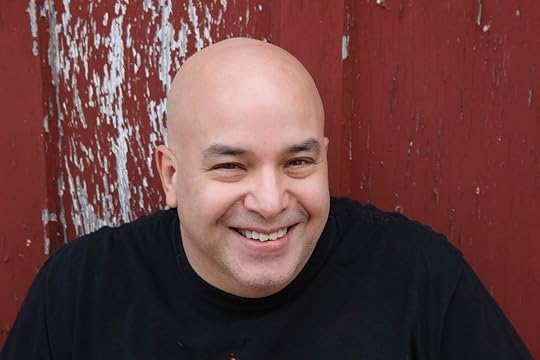 An award winning screenwriter, filmmaker, and educator, William D. Prystauk began writing stories when he still had hair. A former member of BDSM groups in New York and Philadelphia, he brings his knowledge of the subculture to BLOODLETTING, adapted from his script that won second place in the 2006 Screenwriter Showcase Screenwriting Contest and was the top mystery submission. He’s an assistant professor of English at Kutztown University of Pennsylvania. When not writing, he co-hosts The Last Knock horror podcast. Bill enjoys life with his wife, author and editor Ally Bishop, and their puppies. He’s proud of his alternative music and horror movie collections, and the fact that he never leaves any sushi behind. You can find more out about Bill at www.crashpalaceproductions.com. Here's the book description...
An award winning screenwriter, filmmaker, and educator, William D. Prystauk began writing stories when he still had hair. A former member of BDSM groups in New York and Philadelphia, he brings his knowledge of the subculture to BLOODLETTING, adapted from his script that won second place in the 2006 Screenwriter Showcase Screenwriting Contest and was the top mystery submission. He’s an assistant professor of English at Kutztown University of Pennsylvania. When not writing, he co-hosts The Last Knock horror podcast. Bill enjoys life with his wife, author and editor Ally Bishop, and their puppies. He’s proud of his alternative music and horror movie collections, and the fact that he never leaves any sushi behind. You can find more out about Bill at www.crashpalaceproductions.com. Here's the book description...Punk rocker and sadomasochist Denny Bowie, a “legwork guy” for a private investigation firm, is out to find the killer of five masochistic men and his childhood friend, fetish photographer Tommy Heat. He gets back with Penny Dallion, the Goth-girl of his dreams, and is enthralled by the hot and androgynous Erin Marr, his new boyfriend. While investigating Tommy’s murder, Denny discovers pictures missing from Tommy’s meticulous collection. These photos not only hold the key to the killer’s identity, but may also prove Penny’s involvement in the murders. Embroiled in New York’s vibrant S&M subculture, Denny revisits old haunts: fetish clubs in Greenwich Village. With the killer getting closer with each passing hour, Denny’s time is running out.It was nighttime, and I was in Kearny, New Jersey’s Lincoln Theatre (better known as the Stinkin’ Lincoln) to watch a movie called Blade Runner.
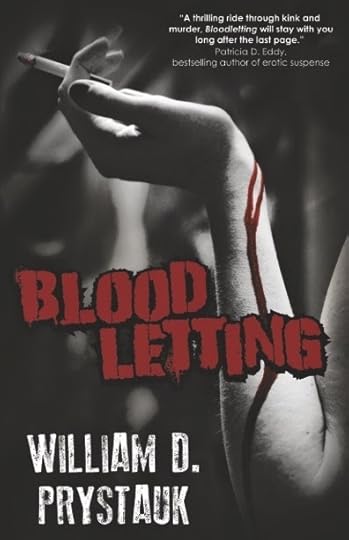 I liked science fiction because it could take me anywhere, and that’s all I cared about. Sure, I loved Harrison Ford since Star Wars and The Empire Strikes Back, and Rutger Hauer was cool, but before I became more of a lover of film, I hadn’t realized that it was directed by Alien’s Ridley Scott, my favorite movie of all time.
I liked science fiction because it could take me anywhere, and that’s all I cared about. Sure, I loved Harrison Ford since Star Wars and The Empire Strikes Back, and Rutger Hauer was cool, but before I became more of a lover of film, I hadn’t realized that it was directed by Alien’s Ridley Scott, my favorite movie of all time.Right from the beginning, I was drawn into the dystopian atmosphere, and I didn’t mind what many had come to hate: Harrison Ford’s voiceover narration. But when I engaged Blade Runner, it was clear that this wasn’t a simple science fiction. Although some films in the genre had weight and merit, many lacked depth and seemed to be disposable when it came to value.
As I watched the film, the value grew. This wasn’t some silly story with freakish aliens and manly space captains, but something of intelligence that kept me mesmerized. And I became so absorbed in the story that when Roy Batty (Hauer) shoved his fingers deep into Dr. Tyrell’s (Joe Turkel’s) eyes as he crushed the man’s skull, I stood up and yelled, “He killed God!” It was safe to say that at sixteen, my mind had been blown.
Blade Runner asked one simple question: What is humanity? Sure, we all know what it is to be human, but what if you were a Replicant with an incep date and a four-year lifespan? Replicants looked human, but were emotionally under-developed, and although they could garner memories and engage in a human experience, they were slave labor to be discarded.
Granted, it sounds almost comical for a company to take the time to create something that doesn’t last as long as a cheap microwave, but the Tyrell Corporation did what they could simply because they could do it. Proving that their Replicants were “More human than human” filled the good doctor with pride. It was more about showing off what he could accomplish regardless of longevity. And it’s not that he hadn’t tried to extend their life spans, but that had failed.
Roy Batty was tough, and hostile, because he wanted “more time”, something many people wish for because we live with regret, guilt, and a sense of obligation that we may only realize is a waste of energy once we’re on our deathbeds. Roy also recognized at the end of his life, even though he appeared to be physically capable as well as good looking. On the surface, he had it all, including experiences “people wouldn’t believe”. But now that he had come back to our little blue ball after being off-world for nearly his entire existence, he wanted to embrace many more experiences.
In that scene with Dr. Tyrell where Roy murdered his maker, his “father”, I could imagine standing before whatever made me to demand the same extension of life.
The man sent to track down Roy and his compatriots, Blade Runner Deckard (Ford), seemed to be nothing more than a man on a mission, even though he had developed a disdain for killing Replicants or “skin jobs”. But if these Replicants weren’t human and ultimately didn’t count, why should Deckard feel anything for them? Deckard is human, and although the world is crumbling around him thanks to pollution and environmental destruction, he too is looking for some semblance of humanity among the garbage.
In this sense, protagonist and antagonist are the same: Deckard and Roy are two sides of the same coin. Though Deckard may think shooting down a Replicant female, in the back no less, is justifiable because she could harm the human population, Roy has no qualms about fighting for more time amongst the people who made him because he knows he’s disposable. If they don’t care about him, why should he care about any human who stands in his way? Deckard and Roy are kindred spirits separated by the slimmest of notions. And in Deckard’s case, killing off the escaped Replicants will allow him to retire (again) and become human (again) with whatever amount of time he has left in this world.
Although I did hate that voiceover after Roy passed on, where he too would fade like “tears in rain” as if he never existed at all, Deckard has a new lease on life. The stronger, more physically resilient Roy could have killed him, but since Roy knew his time was up, why not let something live? After all, Roy had lost everything. His lover, Pris (Darryl Hannah) had been killed by Deckard, and all his Replicant friends were gone. So were his only human connections to the world: Tyrell, his creator, as well as other minor deities who had developed his skin and eyes.
By letting Deckard live, Roy expressed the human trait of mercy, maybe the cornerstone of humanity. After all, as the premier species on the planet, to stop and not kill when other predators keep going says much about intelligence, decision-making, and control.
Deckard lived to fight – or just live – another day. He quickly learned that Roy and the others were human though they were artificial. And maybe that element of humanity could be found in other species of animal or straight-up robots. Humanity, therefore, isn’t for the human, but for the creature that wants to rise above the primordial essence of simply existing. To appreciate life, art, and culture without a cursory need to destroy or triumph.
Blade Runner and its theme cemented the fact that genre can have value and depth, and can certainly change us. As a writer, this helped me shape my stories in tone and theme. Not simply, “What am I trying to say?” but to try and write something people would want to talk about and reflect upon regardless of genre and perceived validity outside of academic circles.
When I left the Stinkin’ Lincoln that night, Blade Runner burned red hot in my mind and forced me to ask questions of life, commitment, desire – humanity – and how far one must go to make something happen for the better. Ultimately, this is what all great stories do: engage the audience to ask questions. Thanks to Blade Runner, I never looked at science fiction the same way again, and I only wish more films could have the humanity to help us embrace more questions about our existence.
Here’s where you can find Bloodletting:
AmazonBarnes & Noble:
GoodreadsBook trailer on YouTube William's website and book details
Published on April 27, 2015 08:30
April 20, 2015
Guest Post: Place Matters by Dean Klinkenberg
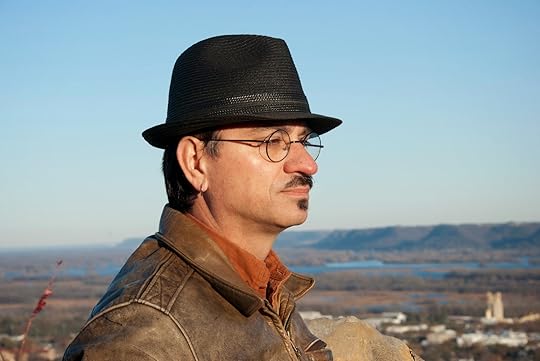 Dean Klinkenberg is the author of Rock Island Lines, a new mystery series featuring Frank Dodge and Brian Jefferson. He also writes the Mississippi Valley Traveler guidebooks and blogs about the river at www.MississippiValleyTraveler.com. Klinkenberg lives in St. Louis.
Dean Klinkenberg is the author of Rock Island Lines, a new mystery series featuring Frank Dodge and Brian Jefferson. He also writes the Mississippi Valley Traveler guidebooks and blogs about the river at www.MississippiValleyTraveler.com. Klinkenberg lives in St. Louis.Here’s the description for Rock Island Lines:
Frank Dodge is in over his head. A writer, he made the trip to the Quad Cities to pursue a story that sounded too good to pass up, a story about the legacy of a big character from a Mississippi River town, a brutal gangster named John Looney. Looney got rich as the ruler of the Quad Cities’ underworld in the early 20th century and created a national crime syndicate long before anyone heard of Al Capone or Meyer Lansky. Dodge is a freelance writer and lives from paycheck to paycheck and needs the story, needs the cash.
Dodge has heard that Miguel Ramirez is probably a descendant of Looney. Ramirez was raised in south Texas, near where Looney died, and came from a family and an area that presented many opportunities to get in trouble, which he took advantage of. Ramirez moved to the Quad Cities for chiropractic school, to turn his life around. He’d be the first Looney descendant to come back to the Quad Cities since the 1920s.
Unfortunately for Dodge, Ramirez dies—is murdered—shortly after they meet and the police suspect that Dodge is the killer. The Moline Police interview Dodge about the murder and suspect that Dodge is hiding something, which he is.
Dodge calls his best friend, homicide detective Brian Jefferson, to help him clear his name and to figure out what actually happened to Ramirez. When Jefferson arrives, Dodge reveals how he met Ramirez and how the two got along well enough to drink their way across the Quad Cities and through the night.
The FBI also has an interest in the murder, in Ramirez. With local police and the FBI investigating the case, the pressure is on Dodge to tell everything he knows, everything he did. While Dodge won’t get his story about a Looney descendant coming back to the Quad Cities, the story of John Looney just might have the clues that will prove his innocence and save his life.
Where we live shapes how we live. This is not a great insight on my part, but I think it’s something that many fiction writers don’t do enough with. There are exceptions.
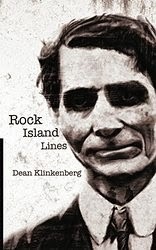 In Northwest Angle, for example, William Kent Krueger sets a mystery in the remote corner of Minnesota where the characters live on the water (or ice) as much as they do on land. It’s a place where people have adapted to the short summers and the brutal winters, where self-reliance isn’t just an abstract political value, but a set of skills necessary for survival. While the characters we meet may be geographically isolated—there is no coffee shop where they can meet for a chat every morning—they are connected to each other anyway, through family or cultural bonds. They know how to get in touch in a pinch, even if it means taking a boat for a half-hour skip across the Lake of the Woods.
In Northwest Angle, for example, William Kent Krueger sets a mystery in the remote corner of Minnesota where the characters live on the water (or ice) as much as they do on land. It’s a place where people have adapted to the short summers and the brutal winters, where self-reliance isn’t just an abstract political value, but a set of skills necessary for survival. While the characters we meet may be geographically isolated—there is no coffee shop where they can meet for a chat every morning—they are connected to each other anyway, through family or cultural bonds. They know how to get in touch in a pinch, even if it means taking a boat for a half-hour skip across the Lake of the Woods.The place where they live, the Northwest Angle, is part of what defines who they are and how they live. Knowing something about that place is as central to understanding the characters as is learning what they think and do. In fiction, however, some writers treat place as nothing more than a table setting. It can be so much more.
Places have depth. Maybe when we think of places with layered histories, we think of European cities like Rome or Athens where building a subway requires digging through thousands of years of the past. All of our places, though, have complex histories, if we take the time to explore them.
A previous house I lived in, a century-old three-story Victorian beauty in St. Louis, had over 90 years of human history that included several deaths and an owner who stored his Harley in the foyer. That house would be a great vehicle to trace the rise, fall, and return of urban neighborhoods, following its residents as it transitions from a home for a wealthy family in a new subdivision to urban pioneers in a declining area to middle class couples in a gentrified neighborhood. But even before that house was built, that place had a history. How many native peoples walked across, fought on, or loved on the land my house occupied in the past 10,000 years? How was their experience of that place similar to or different from mine? How has the place I know been shaped by the people who were here before me?
Where we live, the world around us, shapes us, sometimes in obvious ways. If I lived in San Diego, I imagine I’d be tanned most of the year, my friends and I would exchange ideas on new uses of avocados, and at least some of my social life would take place on a beach. If I lived in northern Minnesota, I’d know a thing or two about curling and how to operate a snowmobile, my social life might revolve around swapping recipes for hotdish, and my friends and I would express our gratitude that, however bad the weather was that day, it could be worse. Just imagine how living in those two different environments might shape the psychological and social lives of the people who live there. Are you more likely to be an optimist if you lived your life in San Diego? Are you more resilient than other folks after living through a couple of decades of winters with little sun and sub-zero cold?
I write about the Mississippi River and environs, so I have no shortage of great places to work with. There are many towns right on the river and people who live in a wide range of housing situations, from blufftop mansions to homemade houseboats moored to shore. It’s easy to imagine that the people who live in those different abodes don’t lead the same kind of lives and probably see the world in very different ways, too.
In the novel I’m writing now, Double Dealing in Dubuque, one of the characters, Big Dan, lives in a cabin in the backwaters of the river. While many people see the river as a place to go for a few hours of recreation, it’s Big Dan’s world. He doesn’t just inhabit the floodplain forest, he’s a part of it as much as the fish and the birds. Years of fishing and foraging for food have shaped his values and how he sees the world and his place in it.
I had a lot of fun writing about Big Dan. I challenged myself to bring out the relationship between the man and the place he lives in, but I wrote with a light touch. It would be easy to end up with a caricature—he’s just Grizzly Adams by the river!—or make him as interesting as a floodplain cottonwood. He has to be more than a collection of driftwood and hawk feathers but those objects can also speak to his character and how he relates to the world around him.
The world we live in impacts our lives in ways small and profound. Fiction is a great place to explore that dynamic, to go deep into the interplay between place and character.
What are some of the most memorable places you’ve come across in fiction?
Find more works by Dean at his Amazon author page, on Goodreads and through Twitter he's @MissValleyTrav.
Published on April 20, 2015 08:00

